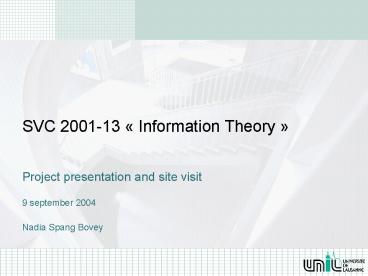SVC 200113 Information Theory - PowerPoint PPT Presentation
1 / 17
Title:
SVC 200113 Information Theory
Description:
Dr. Jean-C dric Chappelier Swiss Federal Institute of Technology ... Previewing. the package / QTI (QTIviewer) 9 sept. 2004. Information Theory SVC project ... – PowerPoint PPT presentation
Number of Views:47
Avg rating:3.0/5.0
Title: SVC 200113 Information Theory
1
SVC 2001-13 Information Theory
- Project presentation and site visit
- 9 september 2004
- Nadia Spang Bovey
2
Project data
- Partner institutions
- Prof. François Bavaud University of Lausanne
- Dr. Jean-Cédric Chappelier Swiss Federal
Institute of Technology - Prof. Jürg Kohlas University of Fribourg
- Initial budget
- Total Fr. 700500.-
- OFES contribution Fr. 250000.-
- Leader partners virtual money Fr. 250000.-
- Leader partners real money Fr. 225500.-
- State subsidized work 10 months (full time)
- Timeline
- Sept. 2001 Dec. 2003 (Aug. 2004)
3
Institutional context
- Fully integrated in all three partner
institutions (credits or exams) - Used by regular students since Oct. 2002
- Evaluated by students, teachers and SVC
pedagogical adviser
4
Univ. of Lausanne
5
Epfl
6
Univ. of Fribourg
7
Production cycle
- Sept. 2001 Oct. 2002
- Prototype and conversion script production
WebCT 3.8 - Production of common modules (4/4)
- Production of linguistics, geography and
statistics modules (3/6) - Production of study help additional material
- Jan. Aug. 2004 (Reduced team)
- 2rd and 3rd course (regular students)
- Adjustments in all three implementations
support to teachers and teaching assistants - Production of additional study help videos (in
progress) - Migration to WebCT Vista (in progress)
- Translation of specialised modules
- Preparation of learning materials for compliance
with reusability and interoperability standards
(in progress)
8
Pedagogical model
- Guided autonomous learning
- A jointly written textbook (3 levels of
mathematical abstraction) - Learning aids of various kinds
- concepts maps
- online tutoring
- control questions with feedback
- assistance for project work
- collective construction of meaning through
negociated exam contracts - metacognitive online work
9
Deliverables ILearning objects
- Course related learning material
- English online textbook French version
- Concept maps
- Control questions
- Demos and calculation tools
- Additions (st. feedback)
- Intro/synth videos
- Conference video
10
Deliverable IIConversion script
- Source text in LaTeX
- Conversion script in Python
- Each teacher can produce its own textbook
- Selected modules
- Selected level of difficulty
- With or without control questions
- French or English version
- Html and pdf files
11
Deliverables IIICourse site
- Various learning scenarii (WebCT 4.0 Vista)
- 80 autonomous/online work / 20 face-to-face
UNIL Introductory meeting C1 video
intro C2 C3 Class meeting C4 G1 video intro (in
prod.) L1 video intro (in prod.) S1 video
intro (in prod.) Collective construction of
meaning Indiv. or group project Learning journal
EPFL Introductory meeting C1 - C3 Video
synthesis (in prod.) C2 - I1 Video synthesis (in
prod.) C4 - I2 I3 Video synthesis (in
prod.) Additional modules S1 L1
UNIFR Introductory meeting C1 I3 In class
introduction C2 - C3 - I1 In class
introduction C4 - I2
4.0
4.0
V
4.0
Maintenance
12
Deliverables IVCourse evaluation
- Students evaluations (2002-3 / 2004)
- Report group (5 students 3-6 reports / 1 sem.)
- Class questionnaires (3x cohort 12 / 1x cohort
3) - Teachers and pedagogical advising team evaluation
- One-day seminar (17.09.2003) with
- All teachers teaching assistants
- Interstices (SVC mandate)
- Development team
Maintenance
13
Deliverables VProject visibility
- Papers and presentations
- ONLINE COURSE DESCRIPTIONS
- EPFL eLearning Day (June 2002)
- SVC workshop on Active Pedagogy (Fribourg Oct.
2002) - SVC workshop on Course Evaluation (Genève May
2003) - SVC Days (Lucerne May 2004)
- Ed-Media (Lugano June 2004)
- CHANGE IN TEACHING PRACTICE
- Site (Atlanta March 2004)
- Math teaching online vs in-class (in progress)
14
Deliverables VIStandardisation
- Reusability and interoperability strategy (in
progress)
- IMS Content Packaging
- IMS QTI
- IMS Learning Design
15
Deliverables VIStandardisation
Preparing the material for compliance
- Modeling the course and the learning activities
- Writing the imsmanifest.xml file
- Writing the LOM (Learning Objects Metadata)
- Producing the QTI xml
- Describing the LD (Learning Design) components
- Packaging and distributing the files
Maintenance
16
Modeling
IMS recommandation USE CASE description
according to Unified Modeling Language (UML)
conventions
Information Theory 2nd semester
(Visual Paradigm)
17
Writing the imsmanifest.xml file
18
Previewing the package / QTI
(QTIviewer)
19
Maintenance
- Creation of additional study helps (eg. treatment
and integration of several videos) according to
available students feedback - Completion of migration to WebCT Vista
- Support to students and teachers in adopting new
habits - Diffusion of content and scripts in the academic
community - Participation in an international network for the
development of educational technology
interoperability standards
20
THE END































